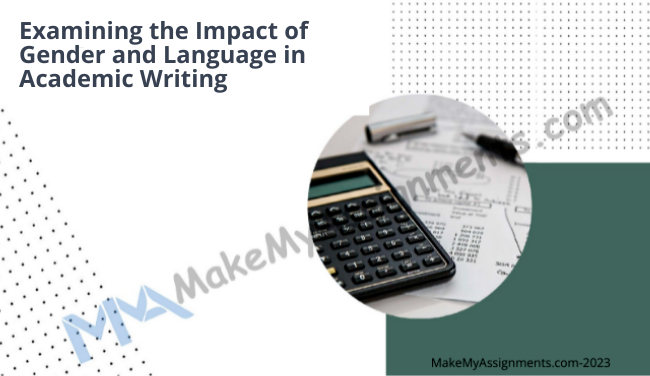
Examining the Impact of Gender and Language in Academic Writing
Academic writing serves as a window into the scholarly world, shaping and reflecting the intellectual discourse of our time. In this exploration, we delve into the nuanced relationship between gender and language, shedding light on how these elements interplay within the realm of academic writing.

The Gendered Lens
It is undeniable that gender plays a significant role in shaping the perspectives and voices present in academic discourse. Historically, scholarly writing has been dominated by male voices, leading to a gendered landscape that has gradually begun to shift. In recent years, there has been a growing awareness of the need to amplify the voices of women and other marginalized genders in academia.
The Impact of Pronouns
One subtle yet powerful aspect of language is the use of pronouns. The traditional dominance of male pronouns in academic writing has contributed to a sense of exclusion for women and non-binary scholars. Efforts to address this imbalance involve embracing gender-neutral language, a practice that fosters inclusivity and reflects the diversity of voices within academic circles.
Challenges and Progress
Despite strides towards gender inclusivity, challenges persist. The academic community must continue to confront and dismantle gender biases embedded in language. Recognizing the influence of language in perpetuating gender norms is a crucial step towards fostering a more equitable academic environment.
Language as a Tool for Empowerment
Language holds the power to empower or marginalize. Academic writing, when approached with sensitivity to gender dynamics, can serve as a means of empowering underrepresented voices. By consciously choosing language that transcends traditional gender norms, scholars contribute to a more inclusive and diverse scholarly landscape.
Intersectionality
Understanding the intersectionality of gender with other aspects of identity is essential. The impact of language in academic writing extends beyond gender alone, intersecting with race, ethnicity, and other dimensions of identity. Recognizing and addressing these intersections is integral to creating a truly inclusive academic discourse.
In examining the impact of gender and language in academic writing, it becomes evident that language is not a neutral tool. It carries the weight of historical biases and societal norms. By conscientiously choosing language that challenges these norms, scholars can contribute to a more inclusive and equitable academic landscape. As we celebrate the diversity of voices within academia, let us continue to navigate the evolving terrain of language, paving the way for a more representative and empowering scholarly future.
In the evolving landscape of academic writing, students often find themselves grappling with the complexities of language, gender dynamics, and the imperative to foster inclusivity. MakeMyAssignments recognizes these challenges and strives to provide a supportive platform that goes beyond conventional academic assistance. Here’s how MakeMyAssignments can be a valuable ally in navigating the nuanced intersection of gender and language in academic writing:
- Inclusive Language Guidance: MakeMyAssignments understands the importance of using inclusive language that respects diverse gender identities. Our team of experienced writers is well-versed in crafting content that adheres to inclusive language practices, ensuring that your academic work reflects a commitment to diversity and equality.
- Expert Writers with Sensitivity: The writers at MakeMyAssignments are not just experts in their respective fields; they are also attuned to the nuances of gender dynamics in language. When you seek assistance from us, you can trust that your assignments will be handled with sensitivity to gender-inclusive language, contributing to a more equitable representation of voices in your academic work.
- Customized Support for Intersectionality: Recognizing that the impact of language extends beyond gender, MakeMyAssignments provides tailored support that acknowledges the intersectionality of identity. Whether it’s addressing race, ethnicity, or other dimensions of diversity, our team is committed to ensuring that your academic writing reflects a nuanced understanding of these intersections.
- Guidance on Pronoun Usage: Pronouns are a crucial element of inclusive language, and our platform recognizes the significance of using gender-neutral pronouns. MakeMyAssignments offers guidance on appropriate pronoun usage in academic writing, empowering students to navigate the evolving landscape of language with confidence.
- Diverse Perspectives in Content Creation: MakeMyAssignments embraces diversity in its team, ensuring that students receive support from individuals with varied perspectives. This commitment to diversity extends to the content we create, enriching your academic work with a breadth of viewpoints that reflect the multiplicity of voices in today’s scholarly community.
- Educational Resources on Inclusive Writing: MakeMyAssignments goes beyond providing assignment assistance by offering educational resources on inclusive writing practices. Students can access guides, tutorials, and tips on incorporating inclusive language in their academic work, empowering them to develop these skills independently.
In conclusion, MakeMyAssignments stands as a reliable partner for students navigating the intricate terrain of gender and language in academic writing. By choosing our platform, students not only receive expert assistance but also contribute to fostering a more inclusive and representative academic discourse. Make your academic journey smoother with MakeMyAssignments – where inclusivity meets expertise.



